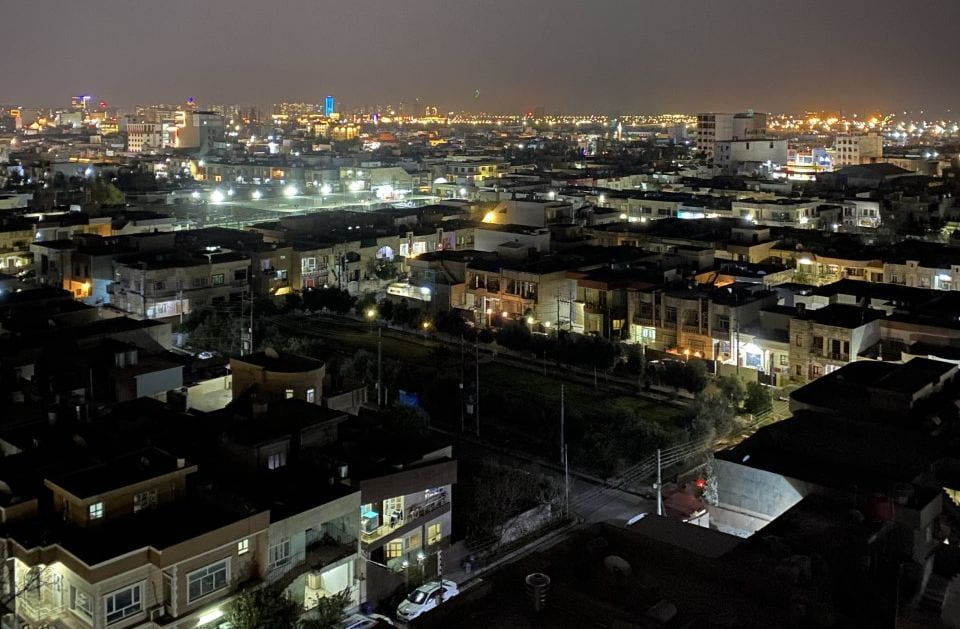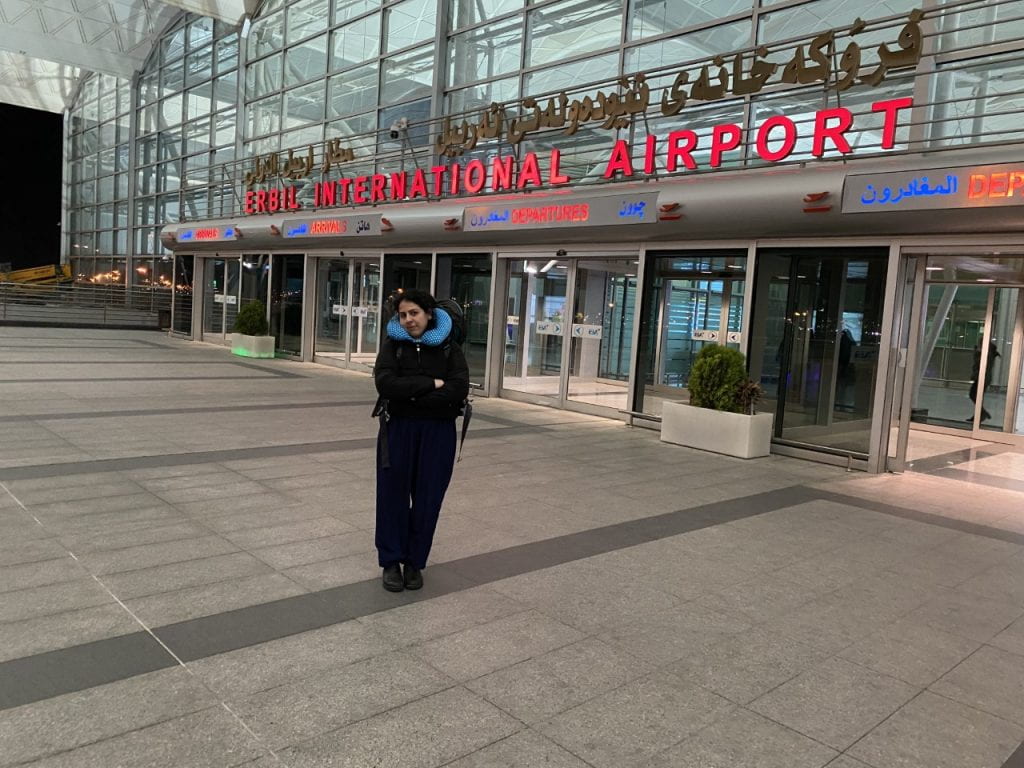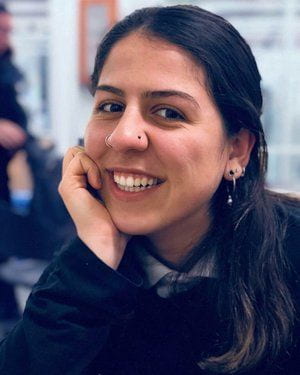Since tensions between Iran, the US, and Iraq grew strong in the start of January 2020, my family felt quite nervous about my brother and me travelling to our homeland, Iraq-Kurdistan, for reading week in February. My brother and I had heard about COVID-19 before we left Canada, but it wasn’t a really big deal at the time – little did we know that the virus would prevent us from coming back to Canada just two weeks later.
Departing from Toronto, with a stopover in Istanbul, we safely arrived in Erbil, Kurdistan on Valentine’s Day. As I visited the bazaars and relatives I had not seen in years, I was greeted with warm chai, fond memories, and an invitation to make myself feel at home.

Rooftop view from Ankawa on the outskirts of Erbil, Kurdistan.
For the first part of my trip, the cities of Erbil and Slemani were buzzing with people in the streets, men socializing in Chai Xanas (tea houses), and families dining in restaurants—there was no talk of the coronavirus. By the last week of my travels, as news spread about the outbreak of the virus in Iran, I witnessed the streets, restaurants, and shops grow emptier day by day. Before I knew it, it was my last Friday in Kurdistan, and I was leaving the following Sunday morning to catch my flight back to Toronto—except, it seemed, that my brother could not check us in online. An hour later, we received an email informing us that our airline had placed a 24-hour ban on all flights from Iraq to Turkey, with no reasoning provided. There were speculations from some media sources that the ban was implemented due to the ongoing Turkish-Syrian conflict; other sources guessed the ban was due to the COVID-19 virus. The bottom line for us was that our flight home was cancelled.
The email instructed us to call our airline and rebook for a flight after the 24-hour ban was to be lifted. This was difficult to do, considering the technical challenges of making international calls from within Kurdistan. We had to download several apps and pay extra fees to find a way to call the airline’s international phone number and talk to a representative—only to find out that the person on the other end spoke nothing but Turkish. In the midst of all this, we were also experiencing a (common) power outage, and the batteries of our laptops and phones were quickly dying. After a frantic four-hour search, we finally reached a representative that spoke English, and we soon had our flights rescheduled for Monday morning. Yet, despite having our flights rebooked, I felt skeptical and was afraid of another cancellation.
By Sunday morning, we were preparing to leave the next day, until we received another email notification that our airline had cancelled all flights coming in and going out of Iraq until at least March 12. After calling our airline again to inquire how my brother and I could leave Kurdistan, we decided to head to the airline office in Erbil ourselves. We were only there for ten minutes before they told us there was nothing they could do for us except wait until travel restrictions were lifted. We were officially stuck in Kurdistan, and the airline company couldn’t offer any flights to our intended destination.
Time was a sensitive matter, as airlines everywhere were cancelling flights fast within the region. After asking my father what my brother and I should do to find a way back to Canada, he urged us to find any available ticket home Within six hours, we witnessed multiple airlines annul flights originating in Iraq, and our panic grew. Ticket prices escalated quickly, as flight companies extended their cancellations until the end of March. Just in time, my brother and I finally found two one-way tickets.
Unfortunately, it cost us roughly an extra $4000 to buy these tickets home.

Standing in front of the Erbil International Airport at 2am for our departing flight.
By early Monday morning, my brother and I were en route, traveling first to Doha, Qatar and then to Boston, Massachusetts. I felt on-edge, passing through busy airports across the globe. But since I only saw about a third of the travelers with masks and/or gloves, it made me feel that COVID-19 was something that wouldn’t affect me much, once I’d be back in Canada. My brother and I were relieved to arrive in the United States, knowing that we were only one flight away from home. That is, until the immigration officer at the Boston airport took our passports the moment we told him we were flying from Iraq. We were instructed to wait in a separate area. Initially, we thought it was a safety measure for COVID-19, as Iraq’s neighbouring country Iran’s outbreak was peaking at the time. An officer escorted us, along with ten other people of colour, to a private area of the airport. Still without any clue why we were brought here, we were then called up by an officer, who began to racially interrogate us. We were asked intrusive questions about our personal lives and families—with absolutely no mention of COVID-19 or any health issues. Our assigned officer went as far as telling us that we “just have the same last names as a lot of ISIS members” to justify why they were interrogating us. I also witnessed a lot of aggressive behaviour from officers towards fellow travellers of colour, and it was unsettling to experience this first-hand. After searching through our bags and keeping us waiting for two hours, they finally released us, and we ran to catch our flight home.
Twenty-two hours after we had departed Iraq, we arrived safely at the Pearson airport in Toronto. Coming home, especially after the Boston airport experience, felt emotional. The financial burden of having to pay back an extra $2000 for a one-way ticket home was beginning to settle in—that’s several months of tuition or rent. Although the past few days had taken a toll on me, seeing family and friends while getting back to my school and work commitments made life soon feel normal again, and I thought I would not have to deal with COVID-19 anymore.
Yet, after my first week of being home, I began to feel very ill and fatigued. I first thought nothing of the random aches and pains, until they began to affect my ability to complete work and function well. My illness didn’t match the symptoms of COVID-19, but I decided to begin self-isolation, just in case. I had to miss a few classes and volunteer jobs I was looking forward to. Ten days after returning to Canada—the day of an endoscopy that I had scheduled for months—I was still experiencing flu-like symptoms. I got in touch with Public Health Ontario, and they advised that I be tested at the hospital prior to my appointment. On the day of my appointment, after a short questionnaire about my symptoms and my travels at the hospital, my endoscopy was cancelled and I was immediately taken to triage to be tested for COVID-19. A cotton swab was shoved far up my nose, and I was advised to go home and self-isolate until I received my results—which would take about 2-3 days. I instantly began telling all the people I was in contact with throughout the previous week to monitor their symptoms and to call Public Health if they are feeling sick due to the possibility that I may have the virus.
Fortunately, two days after the hospital visit, I could breathe easy once again. I received a phone call informing me that my test results were negative for COVID-19. A great deal of relief came over me, knowing that I wasn’t a carrier and that I haven’t infected anyone else. Within days of this happening, Canada began implementing social distancing measures and we soon followed what Iraq had begun doing weeks earlier to prepare for the spread of COVID-19.
Despite the difficult journey to Canada, I am thankful I boarded the home-bound plane in Erbil. My family often asks me what I would do if I was stuck in Kurdistan and couldn’t get home. I think that I would have been okay with that, as long as I had access to the necessary toiletries to last me for months. I would have enjoyed spending some extra time in my homeland and with my family there, if I had known COVID-19 would turn into a pandemic and that Canada would go through quarantine as well. The streets of Kurdistan have recently reopened, and life seems almost back to normal there. I am curious to see what the next few weeks will look like in Canada, and how the COVID-19 experience will impact our lives in the future.

Shilik Hamad is a fourth-year BA student studying International Development with a minor in Political Science at the University of Guelph. Her studies of interest include refugee/immigrant resettlement, development economics, bureaucratic systems, and international relations. Her focus is on development within the Middle East, as well as civil war induced refugee crises and internal displacement issues.

